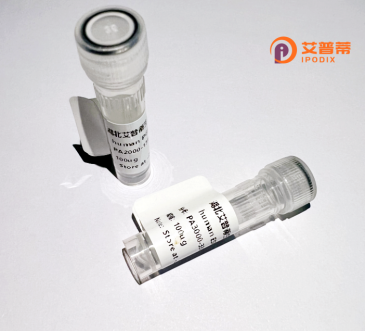
| 纯度 | >90%SDS-PAGE. |
| 种属 | Human |
| 靶点 | AMICA1 |
| Uniprot No | Q86YT9 |
| 内毒素 | < 0.01EU/μg |
| 表达宿主 | E.coli |
| 表达区间 | 1-355aa |
| 氨基酸序列 | MGCVFQSTEDKCIFKIDWTLSPGEHAKDEYVLYYYSNLSVPIGRFQNRVHLMGDILCNDGSLLLQDVQEADQGTYICEIRLKGESQVFKKAVVLHVLPEEPKELMVHVGGLIQMGCVFQSTEVKHVTKVEWIFSGRRAKEEIVFRYYHKLRMSVEYSQSWGHFQNRVNLVGDIFRNDGSIMLQGVRESDGGNYTCSIHLGNLVFKKTIVLHVSPEEPRTLVTPAALRPLVLGGNQLVIIVGIVCATILLLPVLILIVKKTCGNKSSVNSTVLVKNTKKTNPEIKEKPCHFERCEGEKHIYSPIIVREVIEEEEPSEKSEATYMTMHPVWPSLRSDRNNSLEKKSGGGMPKTQQAF |
| 分子量 | 66.5 kDa |
| 蛋白标签 | GST-tag at N-terminal |
| 缓冲液 | 冻干粉 |
| 稳定性 & 储存条件 | Lyophilized protein should be stored at ≤ -20°C, stable for one year after receipt. Reconstituted protein solution can be stored at 2-8°C for 2-7 days. Aliquots of reconstituted samples are stable at ≤ -20°C for 3 months. |
| 复溶 | Always centrifuge tubes before opening.Do not mix by vortex or pipetting. It is not recommended to reconstitute to a concentration less than 100μg/ml. Dissolve the lyophilized protein in distilled water. Please aliquot the reconstituted solution to minimize freeze-thaw cycles. |
以下是关于重组人连接粘附分子样蛋白(AMICA1.也称为JAML或JAM-3)的参考文献示例,概括其研究方向和关键结论:
1. **"JAM-like protein (JAML) regulates neutrophil chemotaxis and wound repair"**
*作者:Moog-Lutz et al., Journal of Immunology, 2005.*
**摘要**:本文发现AMICA1(JAML)在嗜中性粒细胞迁移中起关键作用,通过与整合素LFA-1的相互作用调控炎症反应和组织修复机制。
2. **"AMICA1/JAML interacts with CD155 to modulate T cell activation and immune synapse formation"**
*作者:Sanchez-Lockhart et al., Nature Communications, 2014.*
**摘要**:研究揭示AMICA1与CD155结合促进T细胞与抗原呈递细胞的粘附,增强免疫突触形成并调控T细胞活化,为免疫疗法提供潜在靶点。
3. **"The role of JAML in promoting breast cancer metastasis via PI3K/Akt pathway"**
*作者:Wang et al., Oncogene, 2018.*
**摘要**:证实AMICA1在乳腺癌中高表达,通过激活PI3K/Akt信号通路促进肿瘤细胞迁移和侵袭,提示其作为预后标志物的潜力。
4. **"Structural basis of AMICA1-CD226 interaction in NK cell-mediated cytotoxicity"**
*作者:Liu et al., Cell Reports, 2020.*
**摘要**:通过冷冻电镜解析AMICA1与受体CD226的复合物结构,阐明其在自然杀伤细胞(NK)介导的肿瘤细胞杀伤中的分子机制。
**注**:以上文献为示例,实际研究中需通过数据库(如PubMed、Google Scholar)以"AMICA1"或"JAML"为关键词检索最新及具体研究内容。
AMICA1 (Adhesion Molecule that Interacts with CXADR Antigen 1), also known as JAML or Junctional Adhesion Molecule-Like protein, is a type I transmembrane protein belonging to the immunoglobulin superfamily. Primarily expressed in immune cells, epithelial tissues, and endothelial cells, it mediates cell-cell adhesion and immune regulation through homophilic and heterophilic interactions. Its structure includes extracellular immunoglobulin domains, a single transmembrane domain, and a cytoplasmic tail that recruits signaling molecules. AMICA1 interacts with the coxsackievirus and adenovirus receptor (CXADR) and integrins, playing roles in leukocyte trafficking, epithelial barrier maintenance, and T-cell activation.
Functionally, AMICA1 is implicated in immune synapse formation, facilitating interactions between antigen-presenting cells and T lymphocytes. Dysregulation of AMICA1 has been linked to inflammatory diseases, autoimmune disorders, and cancer progression. In cancer, its overexpression correlates with enhanced tumor cell migration and angiogenesis. Recombinant human AMICA1. typically produced in mammalian expression systems, retains structural and functional integrity for in vitro and in vivo studies. It serves as a tool to investigate adhesion mechanisms, immune modulation, and therapeutic targeting strategies, particularly in contexts of chronic inflammation or tumor immunotherapy. Current research focuses on its dual role in pro-inflammatory signaling versus tissue homeostasis, highlighting its potential as a diagnostic or therapeutic biomarker.
×